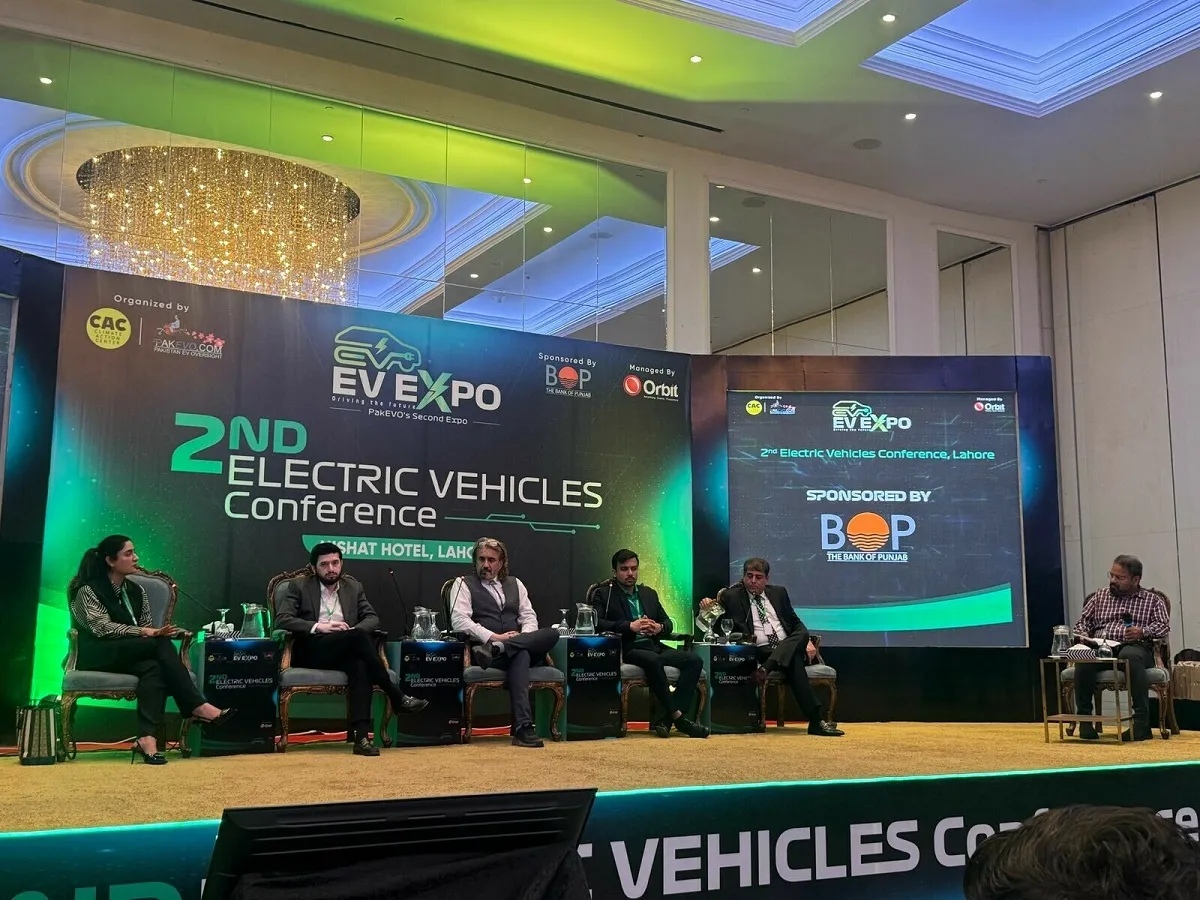Lahore: Pakistan EVs market is swelling quickly, as local production of affordable two-wheelers has driven a surge in EV sales, with 1.4 million units sold in 2024.
The 2nd Electric Vehicles (EV) conference, held in Lahore, brought together industry leaders, policymakers, financiers, and climate advocates to explore how to accelerate EV adoption in Pakistan.
The event highlighted both the potential of the sector and the significant challenges that need to be addressed to create a viable EV ecosystem in the country.
Organized by the Climate Action Centre (CAC) and PakEVO, with sponsorship from the Bank of Punjab, the conference emphasized the need for coordinated public-private efforts to foster EV adoption and local manufacturing.
In his keynote speech, Umer Khan, Head of Investment Banking at Bank of Punjab, underscored the importance of government support in the form of subsidies and tax credits to drive the transition to EVs.
Drawing on global experience, he noted that substantial financial backing is essential for EV adoption to scale in Pakistan.
“Consistent with experience in several countries, the big push and impetus on EV adoption would come with tangible government support in the form of subsidies and tax credits,” said Khan.
He also pointed out the availability of climate finance and international funds, which could be tapped to support EV projects with the right approach.
Rapidly Growing Market
Dr. Aazir Khan, introducing PakEVO, a new initiative aimed at promoting EV education, collaboration, and policy reform, highlighted the missed opportunities in the past due to Pakistan’s economic challenges.
He stressed that the country must align its fiscal priorities with sustainable energy goals, particularly as climate resilience becomes a critical concern.
Despite global EV sales surging by nearly 40% between 2023 and 2024, Pakistan’s EV market remains underdeveloped.
However, there are signs of momentum, including Daewoo’s plan to replace diesel buses with electric ones on shorter intercity routes like Lahore to Sialkot.
Daewoo aims to convert its entire short-route fleet to electric within the next two years, though long-distance EV bus operations will require significant investment and infrastructure development.
Localization emerged as a key theme during the conference, with speakers suggesting that Pakistan could become a regional manufacturing hub for EVs.
Nauman Alvi of EVEE Motors pointed out that local production of affordable two-wheelers has driven a surge in EV sales, with 1.4 million units sold in 2024.
He called for similar localization efforts in EV parts, starting with plastic components, which account for a significant portion of vehicle costs.
In her remarks, Saleha Hassan from DFML emphasized that EVs should not be seen as luxury items but as utility vehicles, noting that hatchbacks represent 52% of the EV market.
She also called for a shift in policy to discourage Completely Built-Up (CBU) imports and support the assembly of EVs locally through the Completely Knocked-Down (CKD) kit model.
While there are encouraging developments, challenges remain.
Pakistan’s charging infrastructure is still limited, restricting EV use to short-distance commutes.
Financing hurdles also present a significant barrier, with high battery costs and limited consumer financing options.
Read More: Chinese auto magnate partners Hub Power to sell EVs in Pakistan
The success of initiatives like the CM Punjab’s Interest-Free Bike Scheme could serve as a model for wider EV financing programs in the future.
The conference also explored innovative financing options such as green bonds, battery leasing, and public-private partnerships.
Global examples, like the US Inflation Reduction Act and Europe’s zero-interest loans, were cited as models that Pakistan could emulate to encourage investment in the EV sector.
Yasir Husain, Director at CAC and the event’s chief organizer, concluded by urging stakeholders to move beyond discussions and take concrete action.
“Climate action needs to move from buzzwords to boardrooms, from talks to transactions,” he said, stressing that EVs provide a bridge between economic resilience and environmental responsibility.
The conference highlighted the need for urgent, coordinated action to capitalize on the EV sector’s potential.
Also Read: EVs to Reach 50% of Auto Sales by 2030
With Pakistan’s youthful population and the growing global EV market, stakeholders agreed that building a national EV ecosystem is not only an environmental goal but also an economic necessity.









